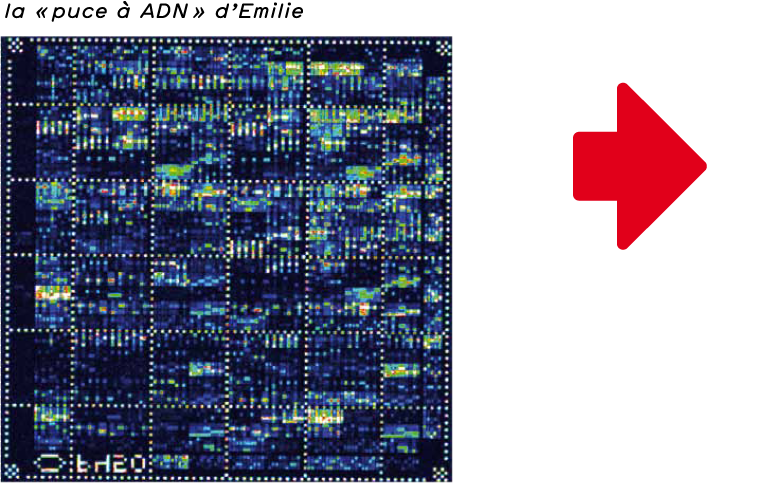Chromosome 10









Gene…Ethics
Emily has been depressed for months now. Her doctor has prescribed medication, but it is not helping her. So he has suggested she does a DNA test. Why? To find a treatment more adapted to her body.
lowers sound and vision
PCDH15: Gene associated with congenital deafness and blindness.
External links
Corresponding protein in UniProtKB/Swiss-Prot
Delayed
CASP7 : this protein called caspase is engaged in repairing self-inflicted holes in a cell’s membrane so that the cell has time to prepare a ‘cleaner’ programmed cell death, that is to say without being detrimental to the environment.
On a tightrope
AIFM2: this gene codes for a protein that removes excess iron, which can be toxic to cells (ferroptosis).
molecular degradation
CYP2E1: This gene plays an important role in alcohol degradation and the detoxication of substances such as paracetamol.
insulin resistance
TCF7L2: Gene involved in the development of type 2 diabetes.
External links
Corresponding protein in UniProtKB/Swiss-Prot
learning
EIF4EBP2: Gene coding for a protein involved in synaptic plasticity, learning and memory formation. The protein is known as a ‘disordered’ protein and its lack of stability gives rise to a new kind of biological regulation.
External links
Protein Spotlight : a question of perspective
Corresponding protein in UniProtKB/Swiss-Prot
tenacious memory
CPEB3: Gene coding for a protein involved in enhancing learning and memory performance. This protein has prion-like properties.
Internal links
Chromosome 20: Prions: two-faced proteinsthe contours of heredity
MKI67: Gene coding for a protein which is important in maintaining the well-known shape of packed chromosomes.
External links
Protein Spotlight : the contours of heredity
Corresponding protein in UniProtKB/Swiss-Prot
headache?
KCNK18: This gene could be involved in migraine.
hibernation
PNLIP: This gene codes for a protein which is involved in the digestion of fats, and plays an important role in animals that hibernate.
noonan
SHOC2: This gene is associated with Noonan syndrome, whose symptoms are developmental delays and hair loss.
External links
Protein Spotlight: The matchmaker
Corresponding disease in OMIM
Corresponding protein in UniProtKB/Swiss-Prot
Internal links
Bioinformatics expert: Noonan syndrome in the OMIM database
our body’s timekeeper
OPN4: This gene is involved in synchronizing our biological rhythms with the alternation of day and night.
External links
Corresponding protein in UniProtKB/Swiss-Prot
little holes
PRF1: This genes codes for perforin, a protein which is able to make holes in cell membranes, thus playing an important role in the destruction of defective cells.
External links
Protein Spotlight: Our hollow architecture
Corresponding protein in UniProtKB/Swiss-Prot
defence
DCLRE1C: This gene codes for the artemis protein which is involved in antibody production.
External links
Corresponding protein in UniProtKB/Swiss-Prot
spotless cells
PITRM1: This gene codes for a protein involved in cleaning cells.
